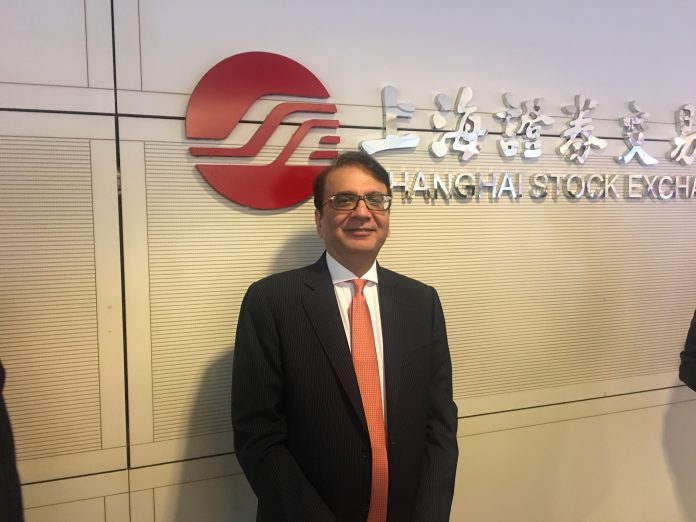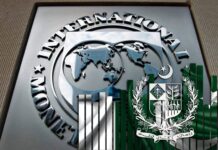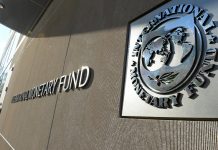
Interview: Najam Ali, CEO, Next Capital
The International Monetary Fund (IMF) came up with a dire warning for our policymakers last week: Pakistan’s gross foreign currency reserves may drop to $9.37 billion by June 2018, from $12.8 billion on Feb 14, if it fails to bring in sufficient foreign capital inflows.
Simply put, the IMF has set alarm bells ringing for the economy. With the current level of foreign exchange reserves sufficient for just 2.2 months of imports, the country seems to be back on the verge of another balance-of-payments crisis within 18 months of completing a three-year IMF programme worth $6.6 billion.
Although a majority of analysts seem to agree with the IMF’s economic assessment, a few of them have voiced a note of dissent.
“Pakistan always faces external account issues in years that see a sudden spike in the growth rate. Supply-side constraints become noticeable whenever GDP growth rate accelerates,” according to Najam Ali, CEO of Next Capital, a Karachi-based brokerage house.
Pakistan recorded a growth rate of 5.3 percent in 2016-17, which is the highest in a decade.
Ali says the industrial base of the country doesn’t have the capacity to respond to increased demand, which is created as a result of sudden economic expansion. Imports grow as a consequence, bringing the trade imbalance under further pressure. “It’s a pattern. High growth leads to increased imports because the industrial capacity is replete with supply-side constraints.”
Pakistan’s imports of merchandise in the first seven months of 2017-18 amounted to $31 billion, up 18 per cent from a year ago. This hurt the current account, which tracks a country’s foreign transactions, as its deficit grew 48 per cent to $9.1 billion over the seven-month period.
But Ali says imports are also rising because of the massive infrastructure projects under the China-Pakistan Economic Corridor. “A cash-flow mismatch will be there for some time. The external account issue has been blown out of proportion,” he says.
The funding gap is invariably resulting in higher borrowing to pay for rising imports. But Ali seems to be looking at the whole situation through a Keynesian point of view that favours borrowing to achieve economic growth. “If growth is taking place and the government is resorting to borrowing, then so be it. Yes, exports should be increased and unnecessary imports curbed. But economic growth shouldn’t stop,” he says.
After accounting for IMF liabilities of $6.3 billion, currency swaps of $5.39 billion, Chinese currency swap of $1.03 billion and liabilities to other commercial banks of $700 million, the IMF says the country’s net international reserves amount to minus $724 million. In contrast, net international reserves were $7.47 billion at the conclusion of the IMF programme just 18 months ago.
Fall in stocks
Investors at the Pakistan Stock Exchange (PSX) have suffered major losses as newspaper headlines scream about the deterioration in economic indicators. From its peak of 52,876 points last May, the benchmark index of the PSX now hovers around 43,480 points, down almost 18 percent.
Many analysts attribute this fall to emerging weaknesses in the economy. According to Ali, however, the assessment isn’t entirely correct. “The kind of economy we have today is more or less the same we had six to eight months back. The same external account problems existed back then. They were even worse, in fact. But the market didn’t collapse,” he says, adding that the main reason for the index decline is political uncertainty.
Another major reason was that foreign investors at the PSX came to believe that the rupee was overvalued, he says. They resorted to profit-taking and started exiting in droves, he added.
“There’s still no clarity. Although the Senate elections are over, uncertainty still exists. The market will stay in the same mood as long as that sentiment prevails,” he says.
Gaining strength
In recent years, Next Capital has significantly grown its investment banking division, which deals with raising new capital for companies. Ali says his house is “consultant to the issue” in as many as five initial public offerings (IPOs) planned for 2018. This is noteworthy because the total number of IPOs at the PSX in 2017 was only three.
Digital services provider Inbox Business Technologies, ethanol producer Unicol Ltd and TPL Life Insurance are among the five companies whose IPOs his house is involved in. He didn’t disclose the names of the other two firms, which are from construction and power sectors, because of regulatory restrictions.

Next Capital earned a net profit of Rs103 million in 2016-17 against a net loss of Rs16.1 million a year ago. Having grown at an annualised rate of 64 percent since 2012-13, Next Capital’s operating revenue for the last fiscal year was Rs353.7 million, up 116 percent from 2015-16.
Although the claim cannot be verified independently, Ali says his house is now among the top four players in investment banking. “My operating revenue should tell you how big Next Capital has grown over the years,” he says. But an industry-wide comparison is difficult to conduct because few brokerage houses are listed on the exchange.
Its latest financial accounts show almost 30 percent of the company’s operating revenue originated from consultancy fee (investment banking) last year. The brokerage segment contributed 70 per cent to the top line with an inflow of Rs249.4 million.
More than 62 percent of brokerage income originated from institutional clients, such as banks, mutual funds and insurance companies, while the rest came from retail investors.
Commending the PSX for its plan to introduce derivative products like exchange traded funds, Ali says the regulator should also resolve fundamental issues. For example, he says, risk management systems with regard to margin regimes, eligible securities and net capital balance calculation method are outdated and should be revised.
“Brokers lack capacity to deal in bigger volumes,” he says. As an example, he cites the regulation that requires a broker to submit 20 percent margin on behalf of his foreign investor. This means that a broker has to give up $2 million for two days if his foreign client has bought equities worth $10 million through his house.
“How should I arrange that much cash? Banks lend only against assets like factories and land, which I don’t possess,” he says, adding that the regulator should develop a mechanism in which foreign investors finance their own margins without hurting brokers’ liquidity.






